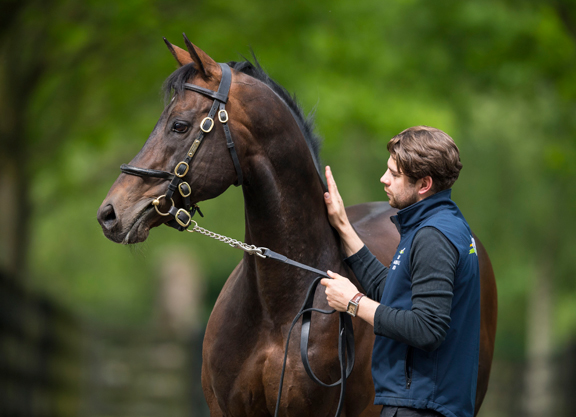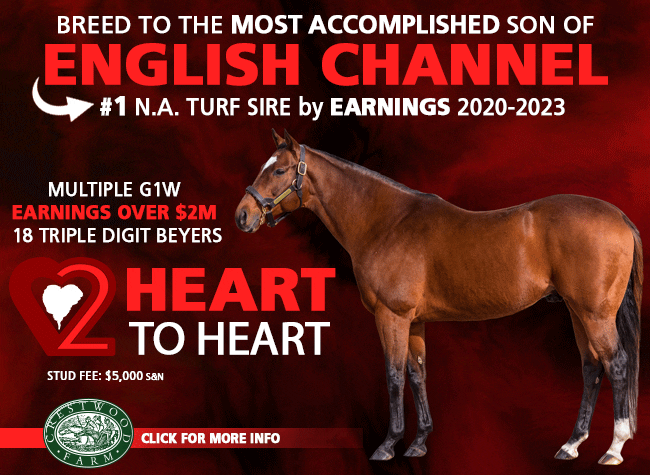By Alayna Cullen Birkett
Young Guns is a series where we endeavour to find out more about some of the young professionals in the industry. Today we speak with Patrick Diamond, who works in nominations and bloodstock management at the Irish National Stud.
TDN: What was your path into the industry?
PD: Reared at Lady Tavistock's Bloomsbury Stud where my father was Stud Groom. Surrounded by horses I was always passionate about racing, pedigrees and bloodstock, but never thought too much about a career in the industry. Convinced my path lay away from horses, I fell into a work experience position with Weatherbys, loved it and ended up staying on. Now determined to pursue a career in the industry, under great advice, I completed the Irish National Stud Course. Upon graduating I spent a fantastic year in Australia at Arrowfield Stud before returning to the INS for a business internship, and have progressed to where I am now.
TDN: Who has been the biggest influence on your career?
PD: I have been blessed with so many influences, Lady Tavistock, Paul Thorman, the Weatherbys and Arrowfield teams were very important and the Messara family were incredible to be around. There are too many to name at the INS, but CEOs John Osborne and Cathal Beale have had a huge impact whilst I owe an awful lot to Sally Carroll. However, my father Peter has certainly had the biggest impact, not only a fantastic stockman, he lives and breathes the industry which is infectious. He has taught and continues to teach me an awful lot and for that I will be eternally grateful.
TDN: What does your role involve?
PD: My main focus would be on nominations, providing our stallions with the platform to prove their quality. The ultimate aim is to offer a roster that allows clients to breed the best possible sales and race horses they possibly can. This involves a lot of pedigree/catalogue research, speaking to clients, seeing stock as well as going to sales and as much racing as possible. I work closely with the yard managers in managing the on farm stock, be that INS or client owned. Offering a premium service to all of our clients is important whether it be management, mating or sale advice. I am also responsible for identifying potential stallions, horses that will suit and excite our clients and that might one day become breed shapers. (Click here for an Irish National Stud video on Diamond)
TDN: What challenges do you face in your role?
PD: The fashion of stallions makes for a huge, but rewarding challenge. The sexiness and commerciality of the first-season sires makes it harder for the second- and third-season sires. At the other end, the market is ruthless in judging stallions' first runners. It's important to believe in the horse you stand, and provide him with every chance to fulfil his potential.
TDN: What advice would you give your 16-year-old self?
PD: Say yes to everything, never turn an opportunity down, you never know who you'll meet, where it will take you or where you might end up. Keep your head down and work hard, but be bold enough to stand out from the crowd.
TDN: What do you think is the biggest challenge facing the industry and how would you solve it?
PD: Nothing original about it. but prizemoney is a massive issue and I don't think we can say it enough until we have a fix. If we could base a model around a basic fundamental that any horse capable of winning one or two races at a level, is able to pay it's training fees for that year. Trainers could charge more and pay staff more. We'd see an increase in staffing and retention numbers, syndication would boom, increased popularity with more involvement, increased number of trainers, people would retain more animals, sales prices would rise and I think it would play a role in restoring the middle distance to staying divisions, if people were comfortable that they would have a fair chance of paying of training fees. There is no easy fix, but looking at the Australian model is a start. We need a reform in the funding of prizemoney, and a rethink on how the money is split. The money at the top end is forever increasing, but do people need a larger monetary incentive to run in the Juddmonte International or the Cheltenham Gold Cup. Would this money not be better served at the middle to lower end? “A rising tide lifts all boats.”
TDN: What do you think horse racing's perception is for the general public?
PD: Being a tourist attraction as well as a functioning stud farm, we meet a lot of non-industry based people on a day to day basis. In general, people are very positive about racing, they see it as a very glamorous and social occasion. People positive about racing, and wanting to go [racing] is important, but getting them involved, interested and wanting to go again because of the horses rather than just the social aspect is vitally important for the longevity of our sport.
TDN: How would you attract more young people into the workforce?
PD: Keeping true to our heritage is important, but we need to continue developing our product so that we capture the interest of the younger people and nurture a true love and fascination for horse racing and bloodstock. It's important to highlight the commitment, dedication but ultimately the fulfilment and joy that working in the industry can bring. Accessibility is the biggest issue, we need to appeal to those without a racing background, and give them a point of access to learn and develop the skills required to succeed in a long-term future in the game.
TDN: Who is your favourite racehorse of all time and why?
PD: Ouija Board (GB) (Cape Cross {Ire}) is right up there, but it has to be Giant's Causeway (Storm Cat). Not only was he supremely talented, but his never-say-die attitude that earned him the title of the “Iron Horse” was just incredible to watch. I would have been eight watching his agonising and unforgettable defeat in the GI Breeders' Cup Classic. How could you not fall in love with racing watching a horse like that?
TDN: Tell us something about yourself that not many people would know?
PD: I'm a decent footballer and played youth football for former top-tier club Luton Town.
TDN: What would you like to achieve in the next five years?
PD: I'd love to see our young stallions take off, have a homebred Group 1 winner and be heavily involved in seeing the INS continue to compete on the world stage. On a personal level, continue learning, developing and meeting as many people as possible.
Not a subscriber? Click here to sign up for the daily PDF or alerts.






